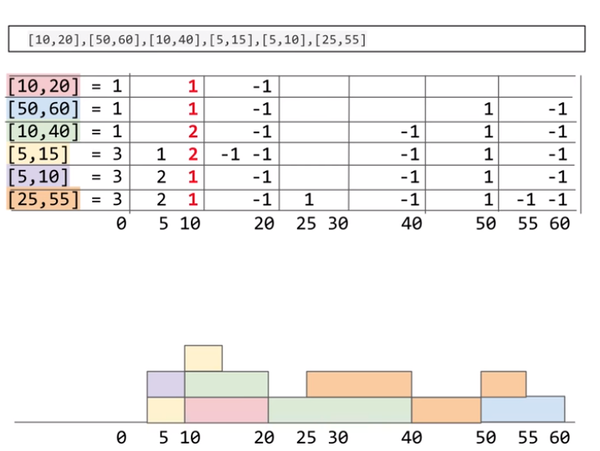732. My Calendar III
https://leetcode.com/problems/my-calendar-iii/description/

/*
* @lc app=leetcode id=732 lang=cpp
*
* [732] My Calendar III
*
* https://leetcode.com/problems/my-calendar-iii/description/
*
* algorithms
* Hard (56.53%)
* Likes: 260
* Dislikes: 90
* Total Accepted: 15.2K
* Total Submissions: 26.8K
* Testcase Example: '["MyCalendarThree","book","book","book","book","book","book"]\n[[],[10,20],[50,60],[10,40],[5,15],[5,10],[25,55]]'
*
* Implement a MyCalendarThree class to store your events. A new event can
* always be added.
*
* Your class will have one method, book(int start, int end). Formally, this
* represents a booking on the half open interval [start, end), the range of
* real numbers x such that start <= x < end.
*
* A K-booking happens when K events have some non-empty intersection (ie.,
* there is some time that is common to all K events.)
*
* For each call to the method MyCalendar.book, return an integer K
* representing the largest integer such that there exists a K-booking in the
* calendar.
* Your class will be called like this: MyCalendarThree cal = new
* MyCalendarThree(); MyCalendarThree.book(start, end)
*
* Example 1:
*
*
* MyCalendarThree();
* MyCalendarThree.book(10, 20); // returns 1
* MyCalendarThree.book(50, 60); // returns 1
* MyCalendarThree.book(10, 40); // returns 2
* MyCalendarThree.book(5, 15); // returns 3
* MyCalendarThree.book(5, 10); // returns 3
* MyCalendarThree.book(25, 55); // returns 3
* Explanation:
* The first two events can be booked and are disjoint, so the maximum
* K-booking is a 1-booking.
* The third event [10, 40) intersects the first event, and the maximum
* K-booking is a 2-booking.
* The remaining events cause the maximum K-booking to be only a 3-booking.
* Note that the last event locally causes a 2-booking, but the answer is still
* 3 because
* eg. [10, 20), [10, 40), and [5, 15) are still triple booked.
*
*
*
*
* Note:
*
*
* The number of calls to MyCalendarThree.book per test case will be at most
* 400.
* In calls to MyCalendarThree.book(start, end), start and end are integers in
* the range [0, 10^9].
*
*
*
*/
// @lc code=start
class MyCalendarThree {
public:
map<int, int> heights;
typedef map<int, int>::iterator IT;
int max_c;
MyCalendarThree() {
heights[INT_MAX] = 0;
heights[INT_MIN] = 0;
max_c = 0;
}
int book(int start, int end) {
IT l, r;
// [l, r]: l.start <= start, r.start >= end
l = prev(heights.upper_bound(start));
r = heights.lower_bound(end);
// [cur, next]表示一个区间
for (auto cur = l, nxt = next(cur); cur != r; cur = nxt, ++nxt) {
// 区间遍历结束
if (nxt->first > end) heights[end] = cur->second;
// 新区间
if (cur->first <= start && nxt->first > start) {
max_c = max(max_c, heights[start] = cur->second + 1);
} else {
max_c = max(max_c, ++cur->second);
}
}
return max_c;
}
};
/**
* Your MyCalendarThree object will be instantiated and called as such:
* MyCalendarThree* obj = new MyCalendarThree();
* int param_1 = obj->book(start,end);
*/
// @lc code=end
Last updated